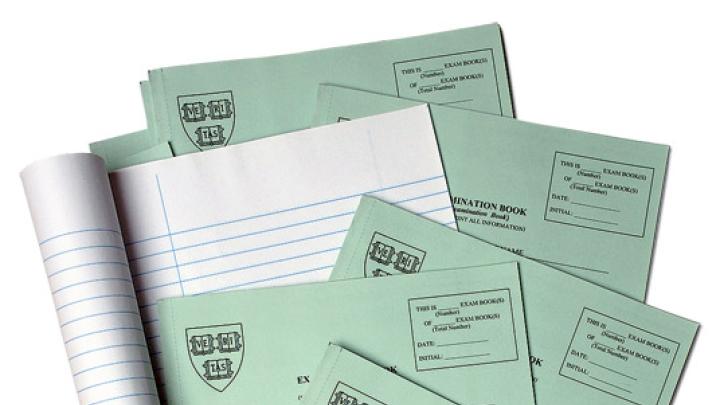At its meeting on May 11, the Faculty of Arts and Sciences (FAS) adopted a bland-sounding motion that henceforth, “unless an instructor officially informs the Registrar by the end of the first week of the term” of the intention to end a course with a formal, seated exam, “the assumption shall be that the instructor will not be giving a three-hour final examination” and no slot will be reserved for it in the schedule. Previously, the faculty members’ handbook specified that courses were assumed to end with examinations unless instructors petitioned for an exemption. That procedure has been uniformly ignored: dean of undergraduate education Jay M. Harris told colleagues he had never received such a form.
The administrative logic aside, reversing the default procedure for scheduling examinations reflects a pedagogical reality. It appears that finals are going the way of the dodo. Harris told the faculty that of 1,137 undergraduate-level courses this spring term, 259 scheduled finals--the lowest number since 2002, when 200 fewer courses were offered. For the more than 500 graduate-level courses offered, just 14 had finals, he reported. Until the 1940s, Harris noted during subsequent discussion, requests to conclude a course without a final examination required a formal vote by the entire FAS.
James Engell, Gurney professor of English literature and professor of comparative literature, rose to suggest that the trend toward fewer exams was not a trivial matter. Last fall, the English department (he is chair) had just five courses that ended with exams. Whatever the merits of requiring just a long final paper, he said, it meant that perhaps nothing beyond the paper itself was being used to evaluate what students were learning. Given that many departments--English, history, classics, for example--have also given up senior-year general examinations, it is increasingly unclear how to answer the question, “How are we assessing students?” And given grade compression, he added, it became difficult to distinguish exceptional from ordinary work in the humanities. He approved of the motion for its bureaucratic rationale, Engell said, but he challenged directors of undergraduate studies and departments to examine the consequences of the trend “to examine less and less and less and less.”
Saltonstall professor of history Charles S. Maier said that in a classroom of 20 students, he and most professors could evaluate students’ performance, but that the differences had become blurred in contemporary grading. As for the diminishing use of exams, he noted that in the new, leaned-down FAS, professors had to proctor them personally--a further disincentive to requiring finals. When he asked whether there were divisional distinctions in the use of exams, Harris said he believed that the sciences and quantitative social sciences were most likely to end courses with finals, the interpretive social sciences and humanities least likely.
Franke professor of German art and culture Jeffrey F. Hamburger said he had observed that courses without exams tended to suffer diminished attendance late in a semester--and that without meaning to be cynical, there was also a correlation between doing away with exams and professors’ absence from campus in the month of May. Commenting more broadly on the “climate of expectations,” Wertham professor of law and psychiatry in society Diana L. Eck (who is also master of Lowell House) said that she had always ended courses with a final exam and a significant paper, and that students increasingly seemed “affronted” by this requirement. And professor of Greek and Latin Richard F. Thomas noted that in the classics, which abolished general examinations only last year (see “Humanities Rebooted,” May-June 2009, page 52), the department had agreed that students would have to take a couple of specified courses that required finals. It should perhaps be a departmental matter, not solely at individual professors’ discretion, he said, to determine the degree to which concentrators should have examinations.
Harris made clear that the motion did not mean that “The College thinks we should do away with final exams.” (Neither he nor anyone else brought up a change from the prior Core curriculum, which generally required final examinations, to the new General Education curriculum, which does not--thereby lessening the likelihood of exams in courses which make up a quarter or more of undergraduates’ work. Crimson reporter Julie Barzilay ’13 wrote in April about the proliferation of alternative kinds of projects and assignments--in lieu of exams or final papers--in many such courses. Harris made the same point in the spring College newsletter to parents.)
Harvard College dean Evelynn Hammonds said that the discussion raised important points about assessment broadly, and indicated that the Educational Policy Committee would, and departments should, begin discussing the topic in a focused way. President Drew Faust noted that Harvard’s recent accreditation review also raised the assessment issue, and that it would have to be addressed for that reason as well.
For now, as a result of the faculty’s vote, professors must indicate early on that an examination will be scheduled; absent that affirmation, a final is fini. Over time, Harris said, as fewer tests are required anyway, that might result in shortening the time scheduled for final exams by a day or two. And in the meantime, students can prepare to book their end-of-term plane flights home with confidence.








